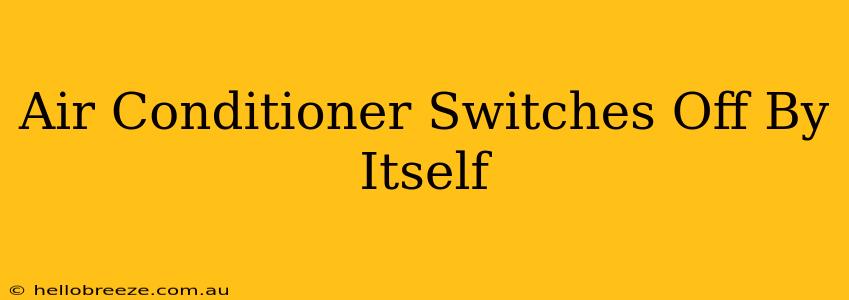Is your air conditioner suddenly turning itself off? This frustrating problem can leave you sweltering in the heat, but don't worry! This guide will help you diagnose and fix the issue, getting your AC back up and running smoothly. We'll cover common causes, troubleshooting steps, and when you might need to call a professional.
Common Reasons Why Your Air Conditioner Keeps Turning Off
Several factors can cause your AC unit to unexpectedly shut down. Let's explore the most frequent culprits:
1. Overheating: The Most Common Culprit
- The Problem: Your air conditioner's compressor and other components generate significant heat. If this heat isn't properly dissipated, the unit can overheat and automatically shut down as a safety precaution. This is a common cause, particularly in older units or those poorly maintained.
- Troubleshooting: Check for obstructions around the unit, both inside and outside. Ensure proper airflow around the condenser (outdoor) unit, free from leaves, debris, or overgrown vegetation. Clean the condenser coils regularly to improve heat dissipation.
2. Frozen Evaporator Coil: Ice, Ice Baby (Not Good!)
- The Problem: A frozen evaporator coil (located inside the unit) is a common reason for an AC unit to shut down. This usually indicates a problem with airflow or refrigerant levels.
- Troubleshooting: Check the air filter. A clogged filter restricts airflow, leading to freezing. Replace or clean the filter immediately. If the problem persists, there may be a more serious issue with the refrigerant or airflow within the unit itself. Call a qualified HVAC technician.
3. Refrigerant Leaks: A Cooling Crisis
- The Problem: Low refrigerant levels prevent the AC from cooling efficiently. This can cause the unit to cycle on and off rapidly, or shut down completely.
- Troubleshooting: This is a complex issue requiring professional attention. Don't attempt to handle refrigerant yourself – it's dangerous. Call an HVAC technician for leak detection and repair.
4. Electrical Issues: Power Problems
- The Problem: Problems with your electrical system, such as tripped breakers, faulty wiring, or overloaded circuits, can cause the AC unit to shut down.
- Troubleshooting: Check your circuit breaker box for tripped breakers related to your AC unit. Reset the breaker. If it trips again immediately, there might be a short circuit or other electrical problem. Call a qualified electrician.
5. Capacitor Failure: The Energy Storage Problem
- The Problem: The capacitor stores energy needed to start the compressor. A faulty capacitor can prevent the compressor from starting, causing the unit to turn off.
- Troubleshooting: Capacitor replacement is generally best left to an HVAC technician. It involves working with potentially dangerous electrical components.
6. Thermostat Troubles: The Control Center Conundrum
- The Problem: A malfunctioning thermostat can lead to incorrect temperature readings, causing the AC to turn off prematurely or not operate correctly.
- Troubleshooting: Try changing the batteries in your thermostat (if applicable). If the problem persists, consider replacing the thermostat.
When to Call an HVAC Professional
While some minor issues like clogged filters are easily addressed, certain problems require the expertise of a qualified HVAC technician. Call a professional if:
- Your air conditioner continues to shut off despite troubleshooting.
- You suspect a refrigerant leak.
- You notice unusual noises or smells from the unit.
- You lack the technical skills or comfort level to handle repairs.
By following this troubleshooting guide, you can effectively diagnose the cause of your air conditioner turning off unexpectedly and take appropriate action. Remember, safety is paramount! Don't hesitate to contact a professional when necessary. Getting your air conditioning system working efficiently ensures a comfortable and healthy indoor environment.

